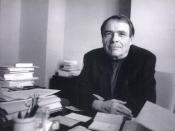Discuss the Relationship Between Culture and Power in Bourdieus' work.
Central to Bourdieus' sociological work is perhaps his insights into powerful forms of social distinction. The style of his research his very different to the norm, and he often crosses over and combines areas of research that would usually be specialised areas. Some regard him as the worlds most successful survey researcher.
He wanted to show a relationship between culture and social class. He spoke of cultural practices as markers of underlying class distinctions. Along with habitus and field, a major concept in his sociology was class. He says that class is, "a universal principle explanation". (Bourdieu, 1984,114).
Bourdieu rejects objectivist and undimensional images of stratification. He differentiates a lot from Marx and takes a lot from Weber. For Bourdieu there are two central meta-sociological concerns. He considers that the debate over whether the existence of social classes just a distorted view of the subjectivism/objectivism antinomy.
He writes, "The problem of social classes is one of the sites par excellence of the opposition between objectivism and subjectivism, which locks research in a series of fictitious alternatives." (Bourdieu 1990, 280)
He tries to give a different understanding of class relations. He sees the world as highly stratified. A world in which individuals strive to maintain or improve upon there their standing in their hierarchically structured social space. He groups three subjectivist approaches, which he rejects. Firstly micro level analyses like symbolic interaction, which he says, fail to recognise that properties of agents location in a hierarchical structure is found in every situation and interaction. Secondly he rejects the approaches, which talk of social class existence and identity as individual or collective consciousness. He also rejects the view of social class as something that is made up and doesn't have roots in...


